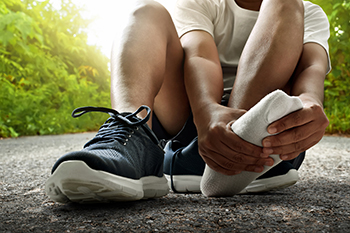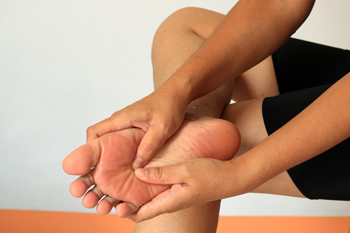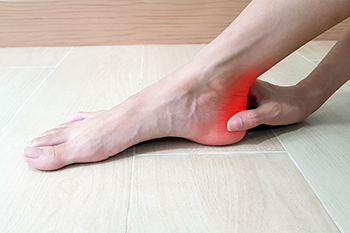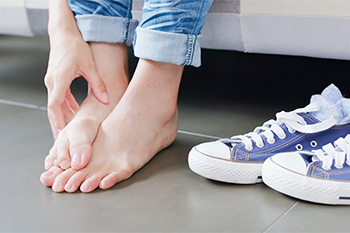Items filtered by date: July 2023
Causes of Foot Pain After Running

Running has become a popular method of keeping physically fit, but it can also come at a price. Besides having a certain level of fatigue, running can also cause painful injuries to the feet. Several factors can contribute to foot pain after running, but experts believe that ignoring the pain can often make matters worse. The top three causes of most foot pain are being overweight, overtraining, and wearing improper or ill-fitting shoes. Wearing shoes that do not fit well or are the wrong type of shoe for the terrain on which running takes place can increase the chances of injury, aches, and sore feet. In addition, poor quality outsoles that fail to cushion the feet adequately can cause foot problems. Running on uneven terrain or hard surfaces can subject the feet to more pressure and lead to unnatural strides. Overtraining, especially running farther than the body can handle, often results in foot maladies such as plantar fasciitis and stress fractures. Carrying extra weight is particularly harmful to the feet, which absorb several times the body weight with each step. This opens up the runner to injury or, at the very least, foot aches and pains. If you experience foot pain after running, it is suggested that you make an appointment with a podiatrist.
Exercising your feet regularly with the proper foot wear is a great way to prevent injuries. If you have any concerns about your feet, contact one of our podiatrists of Quad Cities Foot and Ankle Associates. Our doctors will treat your foot and ankle needs.
How to Prevent Running Injuries
Many common running injuries are caused by overuse and overtraining. When the back of the kneecap starts wearing out and starts causing pain in your knee, this is commonly referred to as runner’s knee. Runner’s knee is a decrease in strength in your quadriceps and can occur if you’re not wearing properly fitted or supporting shoes. To prevent runner’s knee, focusing on hip strengthening is a good idea, as well as strengthening your quads to keep the kneecaps aligned.
What Are Some Causes of Running Injuries?
- One cause of a common running injury is called iliotibial band syndrome.
- Plantar fasciitis is also another common injury.
- Stress fractures can occur from overtraining, lack of calcium, or even your running style.
Best Ways to Prevent Running Injuries
- Wear footwear that fits properly and suits your running needs.
- Running shoes are the only protective gear that runners have to safeguard them from injury.
- Make a training schedule. Adding strengthening exercises as well as regular stretching can help keep you strong and limber and can lessen the possibility of injuries.
- Stretching keeps muscles limber; this will help you gain better flexibility.
If you have any questions please feel free to contact our offices located in Bettendorf, and DeWitt, IA and Rock Island, IL . We offer the newest diagnostic and treatment technologies for all your foot and ankle needs.
Causes of Pain in the Ball of the Foot

Pain in the ball of the foot, which is the area between the toes and the arch, is termed metatarsalgia. Anything that adds pressure to the ball of the foot, such as dancing, running, yoga, or wearing high heels, can contribute to metatarsalgia. In addition, having high arches, existing foot conditions, excess weight, and aging can also affect the ball of the foot. In some cases, resting the feet and taking pain medication can reduce the effects. But if pain continues, then other factors may need to be considered. For instance, nerve damage, tendonitis, and arthritis may be contributing to this painful condition. Structural factors, such as bunions and hammertoes, may be throwing off the alignment and affecting the ball of the foot. Irritation of the nerves beneath the third and fourth toes may cause Morton’s neuroma, which is sometimes described as having a small pebble in the shoe. This development is more common among women who have been wearing high heels for a prolonged period. If you have increased pain in the ball of the foot, it is suggested that you make an appointment with a podiatrist for an examination and possible treatment options.
Foot Pain
Foot pain can be extremely painful and debilitating. If you have a foot pain, consult with one of our podiatrists from Quad Cities Foot and Ankle Associates. Our doctors will assess your condition and provide you with quality foot and ankle treatment.
Causes
Foot pain is a very broad condition that could be caused by one or more ailments. The most common include:
- Bunions
- Hammertoes
- Plantar Fasciitis
- Bone Spurs
- Corns
- Tarsal Tunnel Syndrome
- Ingrown Toenails
- Arthritis (such as Gout, Rheumatoid, and Osteoarthritis)
- Flat Feet
- Injury (from stress fractures, broken toe, foot, ankle, Achilles tendon ruptures, and sprains)
- And more
Diagnosis
To figure out the cause of foot pain, podiatrists utilize several different methods. This can range from simple visual inspections and sensation tests to X-rays and MRI scans. Prior medical history, family medical history, and any recent physical traumatic events will all be taken into consideration for a proper diagnosis.
Treatment
Treatment depends upon the cause of the foot pain. Whether it is resting, staying off the foot, or having surgery; podiatrists have a number of treatment options available for foot pain.
If you have any questions, please feel free to contact our offices located in Bettendorf, and DeWitt, IA and Rock Island, IL . We offer the newest diagnostic and treatment technologies for all your foot care needs.
Dealing With Achilles Tendon Pain

Experiencing pain in the back of the leg just above the heel may indicate an injury to the Achilles tendon. The pain may worsen with exercise and subside after resting. There may also be stiffness, swelling, and soreness in this area. A sudden pain in the back of the heel that feels like a kick in the ankle can be a sign of a torn or ruptured Achilles tendon. If this occurs, it is important to seek immediate medical help. A podiatrist will view imaging tests which can diagnose the exact cause of the injury, and determine its severity. A rupture is a full or partial tear in this tendon, which connects the heel to the calf muscles and allows you to walk. Ruptures to the Achilles tendon are more common among men between the ages of 30 and 50. They are also common among women who are 60 years or older. With an Achilles tendon rupture, it may be difficult to walk normally or to stand on tiptoe. This type of injury may be the result of falling, stepping into a hole, sprinting, or sustaining a cut in the back of the heel. Both surgical and non-surgical treatments are common for Achilles tendon injuries. For help in managing an Achilles tendon injury, it is suggested that you make an appointment with a podiatrist.
Achilles tendon injuries need immediate attention to avoid future complications. If you have any concerns, contact one of our podiatrists of Quad Cities Foot and Ankle Associates. Our doctors can provide the care you need to keep you pain-free and on your feet.
What Is the Achilles Tendon?
The Achilles tendon is a tendon that connects the lower leg muscles and calf to the heel of the foot. It is the strongest tendon in the human body and is essential for making movement possible. Because this tendon is such an integral part of the body, any injuries to it can create immense difficulties and should immediately be presented to a doctor.
What Are the Symptoms of an Achilles Tendon Injury?
There are various types of injuries that can affect the Achilles tendon. The two most common injuries are Achilles tendinitis and ruptures of the tendon.
Achilles Tendinitis Symptoms
- Inflammation
- Dull to severe pain
- Increased blood flow to the tendon
- Thickening of the tendon
Rupture Symptoms
- Extreme pain and swelling in the foot
- Total immobility
Treatment and Prevention
Achilles tendon injuries are diagnosed by a thorough physical evaluation, which can include an MRI. Treatment involves rest, physical therapy, and in some cases, surgery. However, various preventative measures can be taken to avoid these injuries, such as:
- Thorough stretching of the tendon before and after exercise
- Strengthening exercises like calf raises, squats, leg curls, leg extensions, leg raises, lunges, and leg presses
If you have any questions please feel free to contact our offices located in Bettendorf, and DeWitt, IA and Rock Island, IL . We offer the newest diagnostic tools and technology to treat your foot and ankle needs.
Is Athlete’s Foot Contagious?

The medical name for the foot condition that is known as athlete’s foot is tinea pedis. It is an uncomfortable foot rash and is considered to be contagious. Common symptoms that are associated with athlete’s foot can consist of dry and itchy skin between the toes and on the sole of the foot. The fungus that causes this ailment lives and thrives in warm and wet environments, such as locker rooms, public swimming pools, and similar areas. It is beneficial to wear flip-flops or water shoes while in these types of places, and doing this may prevent people from getting athlete’s foot. This condition will generally not improve without medical attention. Permanent relief may be found when prescribed medicine is taken and appropriate shoes are worn which may help to prevent re-infection. If you have the above symptoms, it is strongly suggested that you visit a podiatrist who can effectively diagnose and prescribe the medication needed to treat athlete’s foot.
Athlete’s Foot
Athlete’s foot is often an uncomfortable condition to experience. Thankfully, podiatrists specialize in treating athlete’s foot and offer the best treatment options. If you have any questions about athlete’s foot, consult with one of our podiatrists from Quad Cities Foot and Ankle Associates. Our doctors will assess your condition and provide you with quality treatment.
What Is Athlete’s Foot?
Tinea pedis, more commonly known as athlete’s foot, is a non-serious and common fungal infection of the foot. Athlete’s foot is contagious and can be contracted by touching someone who has it or infected surfaces. The most common places contaminated by it are public showers, locker rooms, and swimming pools. Once contracted, it grows on feet that are left inside moist, dark, and warm shoes and socks.
Prevention
The most effective ways to prevent athlete’s foot include:
- Thoroughly washing and drying feet
- Avoid going barefoot in locker rooms and public showers
- Using shower shoes in public showers
- Wearing socks that allow the feet to breathe
- Changing socks and shoes frequently if you sweat a lot
Symptoms
Athlete’s foot initially occurs as a rash between the toes. However, if left undiagnosed, it can spread to the sides and bottom of the feet, toenails, and if touched by hand, the hands themselves. Symptoms include:
- Redness
- Burning
- Itching
- Scaly and peeling skin
Diagnosis and Treatment
Diagnosis is quick and easy. Skin samples will be taken and either viewed under a microscope or sent to a lab for testing. Sometimes, a podiatrist can diagnose it based on simply looking at it. Once confirmed, treatment options include oral and topical antifungal medications.
If you have any questions, please feel free to contact our offices located in Bettendorf, and DeWitt, IA and Rock Island, IL . We offer the newest diagnostic and treatment technologies for all your foot care needs.

